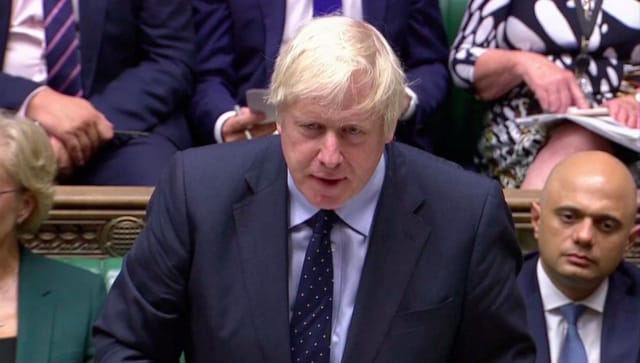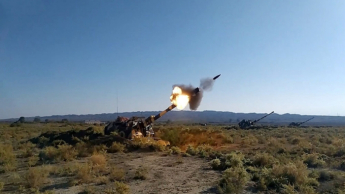COVID variant B.1.617, first detected in India, is forcing UK to rethink its approach

Prime Minister Boris Johnson of Britain said Friday that vaccination protocols would be changed to swiftly deliver second doses to people over 50 years old to combat the spread of a coronavirus variant first detected in India, a warning sign for countries that are easing restrictions even though their own vaccination campaigns are incomplete.
Prime Minister Boris Johnson of Britain said Friday that vaccination protocols would be changed to swiftly deliver second doses to people over 50 years old to combat the spread of a coronavirus variant first detected in India, a warning sign for countries that are easing restrictions even though their own vaccination campaigns are incomplete.
“We believe this variant is more transmissible than the previous ones,” Johnson said. What remained unclear, he said, was by how much. The infectiousness of the variant first detected in India remains the subject of intense study and some leading experts have said it is too early to assess its transmissibility.
If it proves significantly more transmissible, he said, “we face some hard choices.”
He added that there was no evidence that the variant was more likely to cause serious illness and death, and there was no evidence to suggest vaccines were less effective against the variant in preventing serious illness and death.
While he said the country would not delay plans to ease restrictions on Monday, he warned that the spread of the variant could force the government to change course.
“This new variant could pose a serious disruption to our progress,” he said at a news conference on Friday.
The numbers of cases involving the variant, known as B.1.617, rose from 520 last week to 1,313 cases this week in Britain, according to official statistics.
The extent to which the variant has spread globally is unclear, because most countries lack the genomic surveillance capabilities employed in England.
That surveillance capability has allowed health officials in Britain to spot the rise of concerning variants more quickly than other nations, offering an early warning system of sorts as a variant seen in one nation almost invariably pops up in others.
Most cases detected in Britain are in northwestern England. The focus has been on Bolton, a town of nearly 2,00,000 that has one of the country’s highest rates of infection and where health officials have warned of widespread community transmission of the variant. Some cases have also been reported in London.
The rapid spread of the variant has led officials to debate speeding up dosing schedules and opening up access to shots in hot spots to younger age groups.
National restrictions in England are scheduled to be eased on Monday, with indoor dining and entertainment returning, before a full reopening in June. But officials have cautioned that those plans might be in danger.
In Scotland, First Minister Nicola Sturgeon said on Friday that plans to ease restrictions in Glasgow would be delayed at least a week out of concern about an uptick in cases that officials said may be being driven by the variant.
Much is unknown about the new variant, but scientists fear it may have driven the rise of cases in India and could fuel outbreaks in neighboring countries.
Dr Maria Van Kerkhove, the technical lead of the World Health Organization’s coronavirus response, said a study of a limited number of patients, which had not yet been peer-reviewed, suggested that antibodies from vaccines or infections with other variants might not be quite as effective against B.1.617. The agency said, however, that vaccines were likely to remain potent enough to provide protection from serious illness and death.
British officials have said the variant appears to be more contagious than the B.1.1.7 variant, which was detected last year in Kent, southeast of London and swept across Britain in the winter, forcing the country into one of the world’s longest national lockdowns. The B.1.1.7 variant has now been found in countries around the world.
In the United States, the B.1.1.7 variant did become the predominant version of the virus, now accounting for nearly three-quarters of all cases. But the US surge experts had feared ended up a mere blip in most of the country. The nationwide total of daily new cases began falling in April and has now dropped more than 85 percent from the horrific highs of January.
The B.1.617 variant has been found in virus samples from 44 countries and was designated a variant of concern by the WHO this week, which means there is some evidence that it could have an impact on diagnostics, treatments or vaccines and needs to be closely monitored.
Christina Pagel, a member of a group of scientists advising the government, known as SAGE, said postponing next week’s reopening would avoid “risking more uncertainty, more damaging closures and longer recovery from a worse situation.”
“We need to learn from previous experience,” Pagel, the director of the Clinical Operational Research Unit at University College London, said on Twitter.
Britain briefly reopened its economy at the end of last year, only to abruptly impose new restrictions that remained in place for months as it fought a deadly wave of infections.
In an attempt to offer at least partial protection to as many people as quickly as possible, Britain spaced injections between doses for two-stage coronavirus vaccines up to 12 weeks after the first vaccines were approved in December. That was far longer than the three- or four-week interval employed by most other countries.
Johnson said that those older than 50 will now be able to get second doses after eight weeks.
“It is more important than ever that people get the additional protection of a second dose,” he said.
The speedy rollout saved at least 11,700 lives and prevented 33,000 people from becoming seriously ill in England, according to research released by Public Health England on Friday.
Infections, serious illness and deaths have plummeted across Britain. Only 17 deaths were reported on Friday.
But the vaccination campaign has slowed down since last month because of supply shortages and the need to start distributing second doses. The number of daily first doses on average last month was 113,000, far below the average of 350,000 daily doses administered in March.
Only those older than 38 are currently eligible for vaccination.
It remains unclear whether the country has the vaccine supplies on hand to move rapidly to surge more into communities around the country to speed up vaccinating younger age groups.
The Rocket and Artillery formations of the Azerbaijan Army conduct live-fire exercises in accordance with the combat training plan for 2021, the Ministry of Defense of Azerbaijan told Baku Tribune.
LAST NEWS






.jpg&h=67&w=67&zc=1&q=100)













